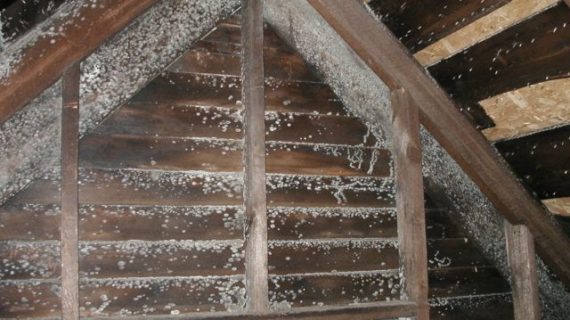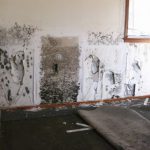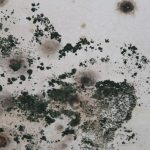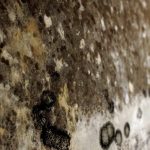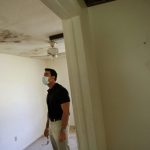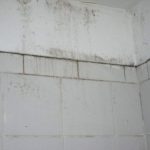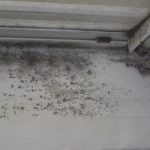Attic is usually dark and damp, so finding black mold in attic is not uncommon. Mold not only ruins your house and decreases its value, but also damages health. However, do not panic when you find black mold growing in your attic. Here is what you can do to remove and prevent it.
What Causes Black Mold in Attic
Mold species such as Stachybotrys chartarum, which looks like slimy growth, loves attic, basement, bathroom, and space under the sink. Black mold can also grow behind the walls or attic ceilings, completely undetected until the occupants smell the presence or experience health problems.
Add bad ventilation and high humidity level, and you get perfect breeding grounds for black mold. Leak from roof may create drips that further dampen your attic, making it more susceptible to mold. You may seldom venture to the attic, which means the mold problem is often neglected until too late.
Mold in Attic Health Problem
Black mold can cause health problems, especially if you or your family members have chronic lung disease, allergies, or weak immune system. Inhaled spores can cause symptoms that can be confused with regular flu, making it harder for early diagnosis.
Some common symptoms of mold exposure include:
- Dizziness, headache
- Sneezing, runny nose, and coughing
- Wheezing breath
- Rashes, itchiness, redness on skin
- Inexplicable exhaustion
- Sore throat
- Red, itchy eyes
People with a good immune system is often safe from the worst effects of black mold. However, if there are babies, elderly people, or anyone with a low immune system and preexisting conditions such as asthma, black mold can be dangerous after a long term of exposure.
How to Treat Black Mold in Attic
Depending on the size of the black mold growth, you can try removing it yourself. For small growths, there are several home remedies to clean them. Here are the steps:
- Remove all the contaminated stuff. Black mold grows easily, so you need to remove all objects that may make the mold grow again. Make sure to wrap them tightly in plastic, to prevent the mold spores from growing and spreading.
- Prepare proper cleaning tools. You need a mask, gloves, and goggles. Make sure to dispose of all of them after the cleaning. Again, you need to wrap them tightly with plastic, before discarding the objects.
- Make sure there is enough ventilation in the attic. Poor ventilation will make you get exposed to flying spores that cannot get out.
- Mix some detergent with warm water until foamy. Use this mixture to scrub the moldy surface as hard as you can. This solution is perfect for nonporous materials, and not ideal for wood.
- Detergent does not work? Add a half tablespoon of baking soda into the water in a medium-sized spray bottle (fill only half the bottle with water). Shake the bottle and spray the mixture to the moldy surface. Scrub the mold clean before spraying again. This time, let the mixture to dry by itself.
- Discard all the tools you use for cleaning (brush, sponge, cloth, etch). Wrap them in plastic before throwing them out. This is to prevent mold spores from flying around.
If the mold returns even after several cleaning attempts, you should call professional mold cleaner to remove it. Black mold that does not go with home remedies requires stronger cleaning methods, which only professionals can apply.
Black Mold in Attic Removal Cost
Environmental Protection Agency (EPA) in the US suggests homeowners try home remedies for mold growth that does not exceed 10 square feet. Household cleaning products are definitely cheap. However, if you need to call for professional mold remediation service, there are several cost possibilities.
An average cost for standard mold remediation in an attic can cost between US$2,000 and $6,000, depending on the size and growth area. However, if the mold infests the internal structures, you need to shell out between US$10,000 and uS$30,000.
How to Prevent Black Mold in Attic
Here are some recommended methods to prevent mold growth:
- Install dedicated dryer vent port
Many people install dryer vent port that opens into the attic, which makes the attic warm and damp. You need to have dedicated dryer vent port, and avoid releasing excessive moisture and heat into the closed attic.
- Keep the roof and plumbing system in good condition
Leak from roofs or plumbing systems can cause growth in the attic. Make sure you regularly check the roof and rain gutter, and fix all damages as proper as possible. Check the plumbing system whenever you see signs of a leak, such as moisture/damp spot on the wall surface.
- Create separate room for water heater and furnace
If you install a water heater and furnace in the attic, make sure to provide a dedicated room for them. The room must be insulated and sealed, preventing heat and moisture to seep into the attic.
Conclusions
Attic should be free from excessive heat and moisture, so black mold will not grow. Black mold in attic can cause many problems, both in health and property. Make sure to clean the mold properly, and make your attic a dry, well-ventilated, leak-free environment to prevent mold.
